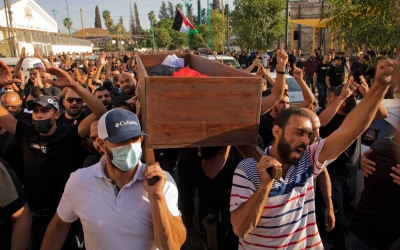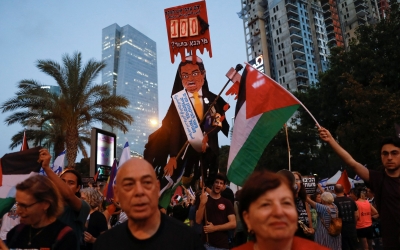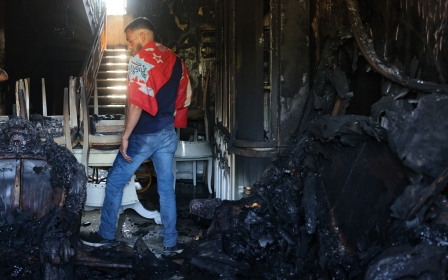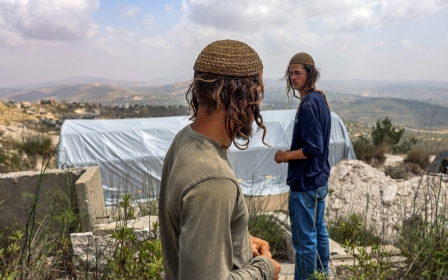Israel: An empowered settler movement relishes chance to 'Judaise' the Galilee

Israel’s religious far-right, galvanised by the state’s most right-wing government in its history, is moving forward in its campaign to "Judaise" areas with substantial Palestinian communities.
While international attention is focused primarily on settlement expansion in the occupied West Bank, areas with large Arab populations inside Israel’s pre-1967 borders are increasingly becoming the focus of a demographic offensive.
Areas including the northern Galilee region, home to large numbers of Palestinians with Israeli citizenship, are being targeted by activists subscribing to the same ideology that seeks to expand settlement activity in the occupied West Bank.
“Settlement in the Galilee, in Judea and Samaria and in the Negev are all excellent,” right-wing activist Orit Spitz told Middle East Eye. “They all have the same value, all are part of the Land of Israel.”
The term “Judea and Samaria” is often used by Israelis to describe the occupied-West Bank.
Following the example of Jewish settlers in the West Bank, Spitz helped establish an illegal outpost more than a year ago, near the Galilee Arab town of Eilabun.
In the West Bank, such outposts are retroactively legalised, especially under the current government, in which the far-right leader of the Religious Zionism party, Bezalel Smotrich, holds broad sway. Now it seems the same thing is beginning to happen in the Galilee.
Netanyahu’s cabinet decided last month that the outpost Spitz was involved in creating, Ramat Arbel, will become a town.
In the eyes of the settler movement, the town will serve as launching point of a national mission to alter the current balance in the Galilee’s population between Jews and Arabs, and achieve clear Jewish primacy in the area.
“We have to fill the Galilee [with settlers] because at present it has an Arab majority,” Spitz explained.
Shared interest and ambition
The idea of boosting the Jewish presence in the Galilee is not new. But today it is being helped along by an Israeli government more receptive to far-right demands than at any point in the state’s history.
Netanyahu’s deference to the far right stems from shared interests and values. He needs the support of the far right to keep his coalition intact, while the far right shares his central policy goal of removing the Israeli supreme court’s ability to check the coalition’s power.
With the court neutered, the far right would have an even freer hand to dispossess Palestinians in the West Bank and degrade the standing of Palestinian citizens inside Israel.
Given Netanyahu's own hard-right history and the fact he conferred legitimacy on the far right before and after last year’s election, critics believe it would be a mistake to believe he has a problem with those goals.
Key figures in the government include Jewish Power leader and Minister of National Security Itamar Ben-Gvir, who campaigned on a pledge to expel “disloyal” Arab and left-wing Jewish citizens, and Religious Zionism leader and Finance Minister Bezalel Smotrich, who has called for the “erasing” of a West Bank village, Huwwara, and threatened to cut off funding to Arab locales.
“It’s clear this government is intensifying racially discriminatory attitudes that favour the Jewish community,” says Yousef Jabareen, a former member of the Knesset.
He uses the term “creeping apartheid” to describe government steps, which have included passing a bill that increases the number of Jewish communities that can effectively exclude Arab citizens from becoming residents.
On 1 August, a celebration of the government’s decision to endorse Ramat Arbel involved Ben-Gvir and other luminaries of the far right, including legislator Aryeh Kellner from Netanyahu’s Likud party. A smiling Spitz looked on as the male politicians danced with young religious settlers.
A loudspeaker blared that Ramat Arbel will become “a large town”. But not all Jews living nearby are excited at that prospect, especially since people like Ben-Gvir are regarded by many as bitter enemies for backing Netanyahu’s bid to increase his powers, as seen in policies such as judicial overhaul.
Spitz and the politicians said Ramat Arbel is only the first seed in what the government calls its "Judaisation of the Galilee Campaign". Palestinian citizens say the endeavour is a further manifestation of Jewish supremacism and racism.
A string of new Jewish communities are to be built, according to Spitz and Moshe Solomon, Member of the Knesset for the Religious Zionism party. This, while Palestinian citizens face land shortage, budget cuts, and lack of master plans that result in home demolitions.
In the south, the government refuses to recognise Bedouin villages, and early this week, hundreds of Bedouins received notices that they would have to vacate their homes in the village of Ras Jrabah to make way for construction of a mostly Jewish neighbourhood in the city of Dimona.
'The majority here is not Jewish'
In Ramat Arbel, as the politicians danced, more than a thousand anti-government protesters from Jewish areas in the vicinity demonstrated against the presence of far-right politicians. Waving Israeli flags, they chanted “Disgrace”, blew horns and beat drums to drown out the festive songs.
Still, a favourite song of the West Bank settlers came through the noise, exhorting “You shall expand towards the Sea, the East, the North and the South.” Daniella Weiss, an influential West Bank settler leader, snapped pictures.
'I’m worried about a Jewish fundamentalist takeover… We want to live in a democracy and they want a state of orthodox Jewish law without Arabs'
– Amir Wohl, Jewish protester
These are heady times for members of the religious right, like Weiss. Recently, the army allowed her Nachala group to reoccupy a settlement near the West Bank city of Nablus on what rights groups say is stolen Palestinian private property.
On a sign above the dancers hung Nachala’s emblem, a map comprising all the territory from Egypt’s Sinai Peninsula and including all of Israel, the occupied territories, Jordan, Syria and Iraq.
Solomon took a break from the dancing to answer questions about where the Galilee is headed under the far-right government.
“Judaisation of the Galilee is a supreme value. There is a consensus in Israeli society on settling, on Judaising the Galilee. It is a very significant area. Since the days of the bible we can be found here, but to our regret, the majority here is not Jewish,” Solomon told the Australian outlet Plus61J Media.
Referring to Palestinian citizens of Israel, he said “there is no problem that they are here, but we want to settle here, establish settlements and bring families to this beautiful place, that there be enough Jews that can live peacefully.
“Whoever lives here that is not Jewish – this is completely all right as long as they don’t harm Jews,” Solomon said.
He added that it is important that the Galilee has a Jewish “character”.
“In a place where there is a settlement there will be a Jewish character. In a place where there is agriculture, there will be a Jewish character. In a place where a plough passes, there will be a Jewish character.”
Solomon argued that Israel had been forced to leave the Gaza Strip and areas in the northern West Bank because Jewish settlement wasn’t strong enough there. “Places where we didn’t have enough of a presence were taken from us,” he said.
“The more Jews there are here, the more employment, culture, education and security there will be,” he added.
But Arabs in Israel are already feeling more insecure, worried about signs the coalition is bent on implementing racist legislation from 2018, the Nation State Law that enshrined Jewish settlement as a national value and which in their eyes, and those of critics, formalised the status of Arabs as second-class citizens.
“When you do not work on improving living conditions of existing villages and towns, and you come and establish new modern towns and settlements, this is discrimination,” said Reem Hazzan, leader of the predominantly Arab Hadash party in the northern city of Haifa.
”This is not to mention that in our narrative these lands were confiscated and belonged to Palestinians. Instead of even jointly enjoying these lands, this is exclusively for Jews.”
Amir Wohl, one of the Jewish protesters against Ben-Gvir, also voiced disquiet.
"I’m worried about a Jewish fundamentalist takeover. Every time ministers come up north, we protest against them. We want to live in a democracy and they want a state of orthodox Jewish law without Arabs.”
Of Ramat Arbel, Wohl said: “This is just a provocation. There are already many settlements for Jews in the Galilee.”
This article is available in French on Middle East Eye French edition.
Middle East Eye propose une couverture et une analyse indépendantes et incomparables du Moyen-Orient, de l’Afrique du Nord et d’autres régions du monde. Pour en savoir plus sur la reprise de ce contenu et les frais qui s’appliquent, veuillez remplir ce formulaire [en anglais]. Pour en savoir plus sur MEE, cliquez ici [en anglais].








